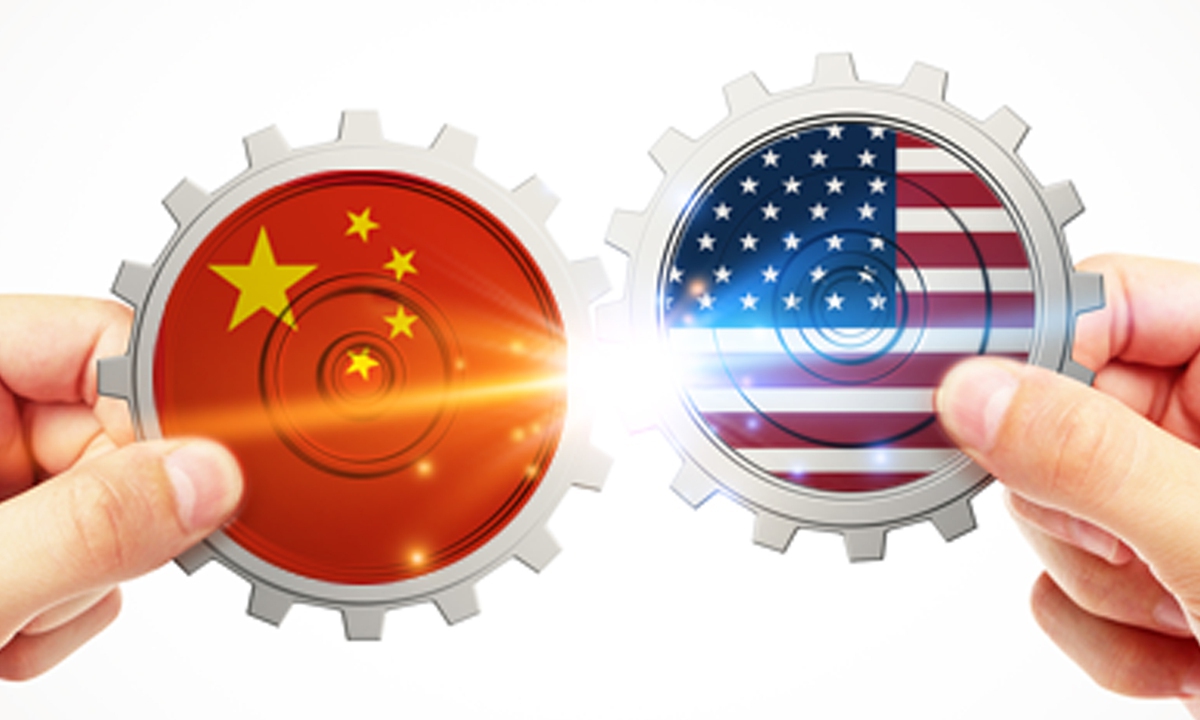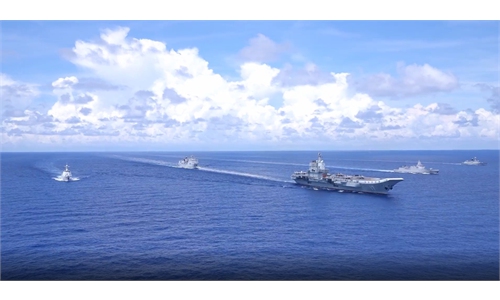
China-US Photo: GT
Ahead of the 20th IISS Shangri-La Dialogue toward which there has been growing speculation about the meeting between the Chinese and US defense ministers, the US, following its commonly-used tactics, hyped again China's "unprofessional" intercept of a US spy plane over the South China Sea, aiming to peddle the "China threat" theory and create some "sensational topics" for the defense summit.
Despite the recent resumption of some high-level engagements between the US and China, the US-China rivalry, driven by Washington's new Cold War mindset of treating China as a competitor, has entered a much profound and multi-dimensional scope, some experts said.
Echoing the first meeting of the National Security Commission under the 20th CPC Central Committee, which indicated that China must be prepared for "worst-case and extreme-case scenarios," experts also called for the need to be prepared to deal with those scenarios in the China-US relations as Washington's China policy could become "more extreme" when the elections loom.
The US military on Tuesday accused China of conducting an "unprofessional" intercept of a US spy plane over the South China Sea. But according to Chinese officials and experts, it is the US that has initiated the provocative military operations near China in the first place.
Extended US close-in reconnaissance operations on China seriously violate China's sovereignty security and are a source of maritime safety issues, and the US should stop such dangerous provocations immediately, Mao Ning, a spokesperson at China's Ministry of Foreign Affairs, said at a routine press conference on Wednesday, responding to the intercept incident.
China will continue to take necessary measures to resolutely safeguard sovereignty security, Mao said.
Meanwhile, PLA Southern Theater Command said on Wednesday that US RC-135 spy plane made an intrusion into PLA Navy Shandong aircraft carrier group's training zone in the South China Sea on Friday, and PLA Southern Theater Command organized aerial forces to monitor, track and professionally dealt with the situation in accordance with law and regulation.
Also on Wednesday, the Chinese Foreign Ministry and the Chinese Embassy in the US expressed strong dissatisfaction and opposition to US sanctions on 13 China-based entities and individuals over alleged involvement "in the international proliferation of equipment used to produce illicit drugs."
"While saying it hopes to resume counter-narcotics cooperation with China on various occasions, the US has again brazenly sanctioned Chinese individuals and entities, which is a serious violation of the lawful rights and interests of the companies and individuals concerned," the Chinese Embassy in the US said.
Most recently, the US Secretary of State Antony Blinken has been lobbying the EU partners at the EU-US Trade and Technology Council, to align for a stronger line on China as the US has been pushing the so-called ''China's economic coercion.''
From diplomacy to military to economy, there have been mixed signals from the already complex China-US relations, signaling that Washington's China policy characterized as rivalry and confrontation remains unchanged, some experts said. They also noted that China should not have "any fantasy" about the US changing or improving its China policy, warning that the US-China rivalry has become multi-dimensional and could get more intense in the future.
Provocation, sanctions
A Chinese J-16 fighter jet performed an "unnecessarily aggressive" maneuver during the intercept of a US Air Force RC-135 aircraft on Friday when the latter was "conducting safe and routine operations over the South China Sea in international airspace," the US Indo Pacific Command said in a statement on Tuesday.
The Chinese warplane "flew directly in front of the nose of the RC-135, forcing the US aircraft to fly through its wake turbulence," read the US statement, with a video attached showing the abovementioned incident.
Chinese experts said it is the US that should reflect on its own provocative military operations near China in the first place, and it's also Washington's commonly used tactics of hyping China's threat ahead of the Shangri-La Dialogue.
For example, during the defense summit in 2022, US Secretary of Defense Lloyd Austin talked about "alarming increase in the number of unsafe aerial intercepts and confrontations at sea" by the Chinese aircrafts and vessels, after Canada made a similar accusation against China.
For this year's Shangri-La Dialogue, some US media outlets have been hyping China "rebuffing" a possible meeting between Chinese and US defense chiefs. Tan Kefei, spokesperson of the Ministry of National Defense, said on Wednesday that the responsibility for the difficulties facing military-to-military exchanges lies entirely with the US, urging the US to show its sincerity and correct its mistakes, creating necessary conditions and atmosphere for the exchanges.
"The US ignores the basic courtesy by keeping our defense chief on its sanction list while seeking communication with us, and how would any talks under such circumstances be possible?" asked Lü Xiang, research fellow at the Chinese Academy of Social Sciences.
Chinese defense minister Li Shangfu was once sanctioned by the US for purchasing Russian weapons for the Chinese People's Liberation Army.
The US-China rivalry has entered a deeper and multi-dimensional scope from security to trade and politics, Lü said, who also calls for the need to be prepared for "possible extreme-case scenarios" such as on the Taiwan question and the South China Sea.
Chinese President Xi Jinping chaired the first meeting of the National Security Commission under the 20th CPC Central Committee on Tuesday. The meeting said the national security issues China faces today are "considerably more complex and much more difficult to be resolved," stressing the necessity of being prepared to deal with worst-case and extreme-case scenarios and being ready to withstand the major test of "high winds, choppy waters, and even dangerous storms."
Besides the hype-up in military, the latest US sanctions on Chinese entities and individuals are also part of its broader agenda of competing and confronting with China, some experts said.
"The US has not entered the year of elections yet but there have been growing rivalry scenarios between the US and China, which shows that Washington's China policy will continue being confrontational, even become more extreme," Li Haidong, a professor at the China Foreign Affairs University, told the Global Times on Wednesday.
Mixed signals
While the US President Joe Biden recently hinted on a thaw of the US-China tense relations, there have been growing high-level re-engagement within which the interactions in trade and commerce have become more palpable, especially when the ongoing trip of Tesla's CEO Elon Musk in China has attracted wide attention and more US executives like JPMorgan CEO Jamie Dimon said they are committed to the Chinese market.
"There are two groups of people in the US in dealing with the US-China relations, one represents the interests of military-industry complex who are unwilling to see any improvement in the bilateral ties," Lü said.
While the other group, representing the interests of commerce and trade, showed the willingness of engaging with China to develop a pragmatic relationship, hoping to find a path of cooperation when rivalry remains in some areas. "In fact, it's the wrestling between various forces within the US," he noted.
Xie Feng, China's newly appointed ambassador to the US, recently said the China-US relationship has once again come to a historical crossroads, toward which some experts believe that how the China-US relations shape will profoundly influence the world's security and interests.
"The current US' China policy if not changed will undoubtedly lead to a new Cold War landscape with more fierce confrontation in the future, which could create a tragic situation in Asia or even in the world with more divisions," Li said.



